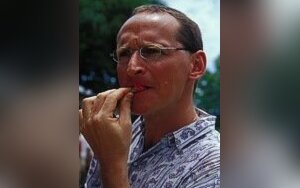- June 5, 2012
- 506
CEJROWSKI: i’M NOT MUCH OF A POLE

It is often said that every Pole has ( through famliy etc.) some ties to Eastern Borderlands. Is this true for you as well?
My family came to Poland with king Sobieski after the Battle of Vienna. We received land in Gdańsk Pomerania, so I have no ties to the Borderlands. I guess that means I’m not a Pole… if every Pole has some ties to the Borderlands, and I don’t, it means I’m not much of a Pole. And fater all, we’re only in Poland since the Battle of Vienna.
Have you ever thought about visiting Wilno, Lwów, or Grodno and making a TV programme or writing a book about them?
I actually visited Wilno right after 1989; unfortunately I have never been to Lwów. When it comes to setting episodes of Boso przez świat there, I don’t think it’s the right area – the viewers prefer the tropical and the exotic, rather than the Polish Borderlands. Indeed – Polish, in my opinion. Since Lithuania refused to acknowledge the Ribbentrop – Molotov treaty, then it automatically acknowledged the pre-WWII borders and the fact that Wilno is a Polish city. As far as I’m concerned, Wilno, Lwów, and Grodno are Polish territory and we should strive to regain them in the long run.Some say Polish Borderlands, others say Stolen Lands. And the Polish anthem explicitly tells people to take back by sword what was taken from us by violence. It is the duty of the Republic of Poland to fight ( through diplomatic, economic means) to regain Polish territory in the East and… I probably shouldn’t be going to Wilno with a camera holding such views, shoud I? (laughs)
Is there anything in particular that you remembered from that visit? What are your memories of Wilno back then?
I discovered that in spite of the whole Soviet occupation it was still entirely Polish city. That was surprising. Of course the name of the streets were in Lithuanian, as were the shopping signs, but it was a thin veneer over a thick Polish substance. It is impossible to gloss over and this is probably why Lithuanian authorities are so nervous when it comes to spelling Polish names and Polish education. They realize that they’re usurpers in somebody else’s city.
Not only are you a traveller, a writer, and a TV and radio host, but you also perform stand-up comedy. On your website it says that you can be hired but “not for everything, not for everyone, and not with everyone.” Would you agree to a show in Wilno?
Gladly. There have been several such offers but so far none of them worked out. Some day, however, a more capable organiser is bound to contact me. In Poland, my every show has 500-1000 people turn up.
You are famous not only as a traveller but also as a sharp-tongued political commentator. I do not know how much are you interested in Polish-Lithuanian relationships and the situation of Poles in Lithuania but perhaps you’d like to attempt evaluating them? And what would you suggest in order to improve them?
Our current relationships are ambivalent – Lithuanian authorities persecute the Polish and try to deprive them of their national identity. It is due to the fear of our culture and historical complex. Understandable and not requiring explanation. And Polish government does nothing to defend the Polish. My suggestions for improving the relationships would be having a truly sovereign government with genuine interest in Polish independence and not a bunch of bootlickers, lackeys, and lapdogs of EU. We have to fight for Poland; independence is a process, not a product. Independence not cultivated by daily acts of care vanishes. Currently the independence of Poland is being dismantled by Platforma Obywatelska, who strives to completely integrate Poland with EU, and handing the rule over to its organs. But we will bring them down. There is currently a Rosary Crusade [Krucjata Różańcowa – przyp. Tłum.] where we shoot the traitors with rosary beads and, God willing, we will prevail.
http://pl.delfi.lt/kultura/kultura/cejrowski-lichy-ze-mnie-polak.d?id=58856065
Tłumaczenie Andrzej Rola w ramach praktyk w Europejskiej Fundacji Praw Człowieka, www.efhr.eu. Translated by Andrzej Rola within the framework of a traineeship programme of the European Foundation of Human Rights, www.efhr.eu.

